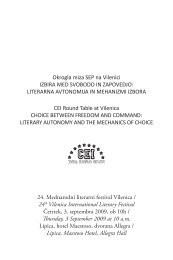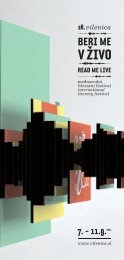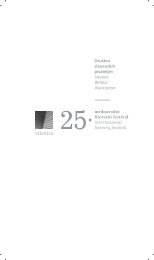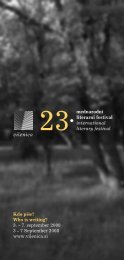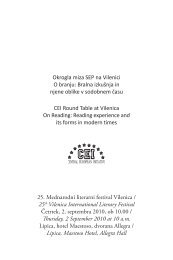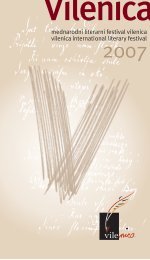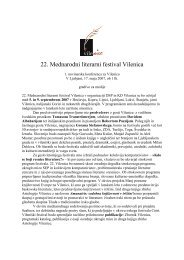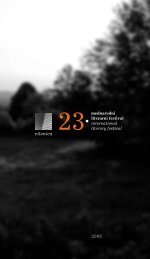Publikacija SEP 2011 - Vilenica
Publikacija SEP 2011 - Vilenica
Publikacija SEP 2011 - Vilenica
Create successful ePaper yourself
Turn your PDF publications into a flip-book with our unique Google optimized e-Paper software.
power that reading grants the reader, the various political, economic<br />
and religious systems that govern us fear such imaginative freedom.<br />
Reading, at its best, may lead to reflection and questioning, and reflection<br />
and questioning may lead to objection and change. That, in<br />
any society, is a dangerous enterprise.<br />
Librarians today are increasingly faced with a bewildering problem:<br />
users of the library, especially the younger ones, no longer know<br />
how to read competently. They can find and follow an electronic<br />
text, they can cut paragraphs from different Internet sources and<br />
recombine them into a single piece, but they seem unable to comment<br />
and criticize and gloss and memorize the sense of a printed<br />
page. The electronic text, in its very accessibility, lends users the illusion<br />
of appropriation without the attendant difficulty of learning.<br />
The essential purpose of reading becomes lost to them, and all that<br />
remains is the collecting of information, to be used when required.<br />
But reading is not achieved merely by having a text made available:<br />
it demands that its readers enter the maze of words, cut open their<br />
own tracks and draw their own charts beyond the margins of the<br />
page. Of course, an electronic text allows this, but its very vaunted<br />
inclusiveness makes it difficult to fathom a specific meaning and<br />
thoroughly explore specific pages. The text on the screen doesn’t render<br />
the reader’s task as obvious as the text in a material book, limited<br />
by its borders and binding. “Get anything,” reads the ad for a mobile<br />
phone able to photograph, record voices, search the Web, transmit<br />
words and images, receive and send messages and, of course, phone.<br />
But “anything” in this case stands dangerously near “nothing.” The<br />
acquisition of something (rather than anything) always requires selection,<br />
and cannot rely on a limitless offer. To observe, to judge, to<br />
choose requires training, as well as a sense of responsibility, even an<br />
ethical stance. And young readers, like travellers who have only learned<br />
to drive automatic cars, no longer seem able to shift gears at will, relying<br />
instead on a vehicle that promises to take them everywhere.<br />
At some point in our history, after the invention of a code that<br />
could be communally written and read, it was discovered that the<br />
75



